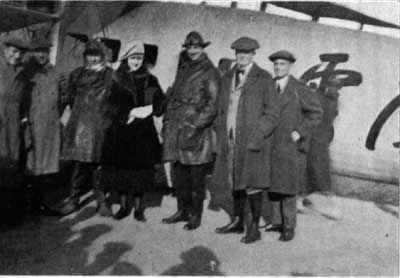| Home -> Other California History Books -> The Log of the Empire State - Chapter VII | |||
|
Chapter VII
Our stay in three-thousand year-old Peking was too short, for besides investigating conditions, attending our Minister Shurman's reception, visiting the country home of the former Prime Minister Hsuing Hsi-Ling, we would have enjoyed spending more time seeing The Summer Palace, The Jade Fountain and the Temple of Heaven to say nothing of studying conditions. About one-thirty, when the gay dance had ended at Hotel de Peking, which by the way, would be a credit to London or New York, we took an hour's rickshaw ride in the moonlight to the Forbidden City. The solemn pom-pom-pom of the funeral dirge for the Mother of the heir to the Chinese Throne, was indescribably impressive. About eighty men bore the casket from the dwelling to its canopied hearse. One of the mourner's told us that the fourteen-year-old heir to the throne, had not cared much, when all his playthings were taken from him, or even when his throne was taken, but that now he was inconsolable over the loss of his mother. After seeing this weird funeral procession of the last of the Ming Dynasty in the gray of early dawn, seeing a Buddha with eyes of pure gold, and also riding the Hodzu rapids, it took an aeroplane ride to create any real excitement in our party. Six of the Chamber of Commerce Representatives decided to see the Great Wall of China and the Ming Tombs, regardless of the lack of time; so Carl Westerfeld, Mrs. Bruce Foulkes, David and Reese Lewellyn, Miss Mary Moynihan and M. Hazlett, Jr., chartered a Vickers Vimmy Biplane. The air-riders felt much less perturbation after being informed that this machine cost the Chinese government fifty thousand dollars, weighed over five tons, and had comfortable wicker seats in a pretty little cabin for nine people. They were so proud to accomplish in an hour and a half, a trip which usually takes two days, that we will tell some of them that they have not come down to earth yet, if they keep on telling us what we missed by not going. We had no sooner gotten accustomed to the Japanese money and were able to say, "Ohio," (good-morning), and a few other Japanese words glibly, when we had to learn "Pidgin English" and use the "Mex" dollar in China, and next we were told to exchange our money from Peking notes to Shanghai currency. The approach to Shanghai, the Paris of the East, along its beautiful row of buildings on the waterfront, and called The Bund, surprised even the muchly thrilled Chamber of Commerce Party. The American Consul, C. T. Cunningham, was very ill, but his wife gave us a reception. A dinner by the Chinese Chamber of Commerce and an examination of trade exhibits followed. The six physicians of the party received their biggest surprise at the Chinese Theatre when, in the middle of the performance, a large towel that had evidently been dipped in warm water, was passed around to the audience so that the theatre-goers might wipe off the perspiration or beads of excitement from their faces and hands. The towel was a rich shade of brown by the time it reached our party. Germs? Why they never thought of such a thing and seem to feel, "Where ignorance is bliss, 'tis folly to be wise." If Shanghai thrilled us, Hongkong fascinated us, when we ascended in a railroad something like our Tamalpais cars to the peak. To reach the very top, cozy wicker chairs, mounted on bamboo poles, carried by two coolies, are necessary. The movement of the chair while descending reminds one of a ride on a rather old, single-gaited horse. Our party will always associate Macao, China, with "Dante's Inferno." To see the half-clothed Chinese bending over their open fires in the opium factory, to see children soldering the covers of the little boxes their brothers have just finished mixing and filling, will always be an awful, vivid picture in our memories. The cigar factory also seemed a fine sample of what some good people wish us to believe awaits the wicked. Babies, not able to walk, are busy working beside their mothers stripping the tobacco leaf from the stems. If the cigar and opium factories shocked us, the firecracker factory appalled us. A crowd of youngsters huddled in a tiny, filthy room filled with powder, were working with wonderful dexterity, ceaselessly putting fuses in firecrackers. No one seemed to notice or care if a visitor might carelessly let a light fall from a cigar or drop a match. Many of us decided that perhaps the proverb: "If you want to make a Chinese happy, just buy him a coffin," is not so far off, because death to many of them looks much more attractive than life. We were told that if a Chinese falls off his sampan, his neighbor does not try to save him. That would be a "Bad Joss" as they say and would incur the wrath of the River God, who pulled him in. Then, too, the rescuer would have to support him for the rest of his days. |
|||
 |
|||